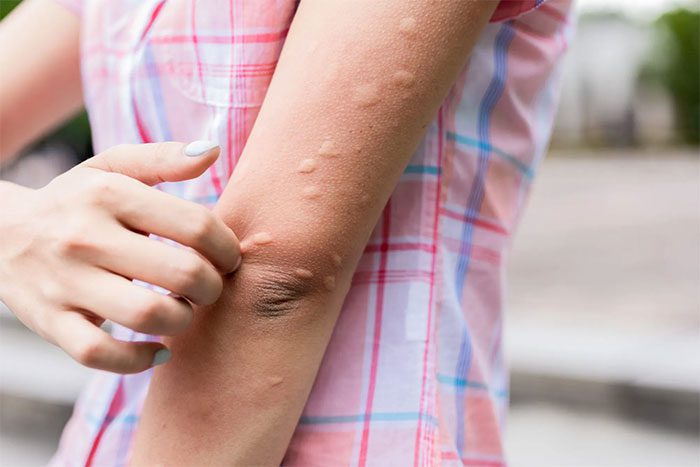Allergies are a concerning phenomenon in which our bodies react abnormally to food, pollen, pet dander, or insect bites. So why are some people more prone to allergies while others are immune to similar triggers?
The Body’s Self-Defense Mechanism Against External Agents
Allergy is a very common immune response, a self-defense mechanism that occurs when the body fights against external substances. It happens when the body develops an allergic reaction to a specific substance, usually due to an abnormal reaction of the immune system to that substance.
When we are exposed to the environment, our bodies come into contact with many types of substances known as allergens. These allergens can include pollen, pet hair, dust mites, food, medications, etc. For most people, these substances are harmless, but for those with allergies, they can trigger an abnormal reaction in the immune system.

The immune system is an important defense mechanism of our bodies, able to identify and attack pathogens (such as bacteria, viruses, etc.) that invade our bodies. However, in some individuals, the immune system mistakenly identifies harmless substances as threats, causing allergic reactions.
When the immune system encounters an allergen, it releases certain chemicals, such as histamine. These chemicals cause blood vessels to dilate and trigger an inflammatory response, leading to allergy symptoms. These symptoms can include a runny nose, sneezing, coughing, shortness of breath, skin itching, redness, and swelling.
The severity of allergic reactions varies from person to person. For some individuals, allergic reactions may only cause mild discomfort, while for others, they can severely impact their daily lives. In severe cases, it can trigger life-threatening allergic reactions, such as anaphylaxis.

Allergy is a complex process involving multiple factors. Firstly, allergies have a certain genetic predisposition; if someone has a family history of allergies, the likelihood of developing allergies is higher. Secondly, environmental factors can also influence the onset of allergies. For example, air pollution, exposure to chemicals, and dietary habits can increase the risk of allergies.
Classification of Allergens and Analysis of Common Allergy Symptoms
- Food Allergens. Food allergy reactions refer to food components that cause allergic responses in the body, leading to a range of symptoms. Common food allergens include milk, eggs, tree nuts, peanuts, fish, shellfish, soy, wheat, and certain fruits and vegetables. The allergy symptoms can vary somewhat depending on the specific allergens.
In general, food allergy symptoms can be divided into gastrointestinal symptoms and systemic symptoms. Common gastrointestinal symptoms include abdominal pain, diarrhea, vomiting, and loss of appetite; while systemic symptoms can include skin itching, hives, headaches, coughing, shortness of breath, and asthma.
- Environmental Allergens. Environmental allergens refer to substances found in our living environment, such as pollen, dust mites, mold, etc. When the human body comes into contact with these environmental allergens, allergy symptoms may occur. Common environmental allergy symptoms include nasal congestion, runny nose, sneezing, itching, and watery eyes.

Allergy is a very common immune response of the body. (Illustrative image).
Generally, these symptoms appear seasonally or in specific environments, such as pollen allergy symptoms in spring, mold allergy symptoms in autumn, etc. For some individuals, exposure to pet dander or certain household items can also trigger allergic reactions, manifesting as skin allergy symptoms such as contact dermatitis.
- In addition to food allergens and environmental allergens, some individuals may also be sensitive to drug allergens. Common drug allergens include antibiotics, antipyretics, pain relievers, penicillin, etc. Drug allergy symptoms include rashes, hives, headaches, fever, nausea, and vomiting. Severe drug allergic reactions can lead to anaphylaxis, with symptoms such as low blood pressure and shortness of breath.
How to Reduce Allergic Reactions?
Reducing allergy symptoms by avoiding exposure to allergens is an effective method. It is important to know what you are allergic to. For example, if you are allergic to pollen, minimize outdoor activities in spring and keep windows closed to prevent pollen from entering the home. Additionally, air purifiers with high-efficiency filters can help filter allergens from the air and reduce symptoms.
Medications are one of the common ways to reduce allergic reactions. Antihistamines are commonly used medications that block the release of histamine and alleviate allergy symptoms.

It is essential to know what you are allergic to. (Illustrative image).
Immunotherapy is a long-term treatment for allergies. This approach works by gradually exposing the body to the allergen, allowing the body to gradually produce antibodies and increase tolerance to the allergen. Immunotherapy can be administered through injections or orally. Before starting immunotherapy, doctors will conduct allergy tests to identify the allergens and the level of sensitivity.
Subsequently, doctors will develop a personalized immunotherapy treatment plan based on the test results. Immunotherapy usually takes time, and the effects will gradually appear as the treatment progresses. Although immunotherapy is very effective for some allergens, it may not work for everyone, so it is advisable to consult with a doctor when considering this method.

Some daily habits can also help reduce allergy symptoms. (Illustrative image).
In addition to the three methods mentioned above, some daily habits can also help reduce allergy symptoms. Keeping the indoor air fresh and ventilated, and regularly cleaning the indoor environment can reduce the growth of dust mites and mold. Use bedding and clothing made from natural fibers and avoid contact with chemicals that may irritate your skin. Getting enough sleep and maintaining a healthy diet can boost the immune system and help reduce allergic reactions.


















































